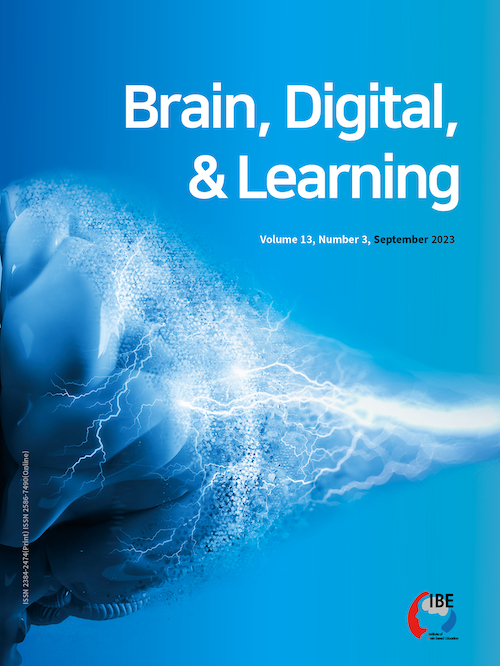학술논문
Development of A Functional Model for An AIbased Adaptive Learning Platform
이용수 0
- 영문명
- 발행기관
- 한국교원대학교 뇌·AI기반교육연구소
- 저자명
- Jung-Ho Byeon Hyun Ju Park Yong-Ju Kwon
- 간행물 정보
- 『Brain, Digital, & Learning』제15권 제3호, 331~355쪽, 전체 25쪽
- 주제분류
- 사회과학 > 교육학
- 파일형태
- 발행일자
- 2025.09.30
5,800원
구매일시로부터 72시간 이내에 다운로드 가능합니다.
이 학술논문 정보는 (주)교보문고와 각 발행기관 사이에 저작물 이용 계약이 체결된 것으로, 교보문고를 통해 제공되고 있습니다.

국문 초록
This study aimed to examine how experts in AI-based learning perceive the categories of learning platform components to which AI technologies are applied, as well as the interrelationships among these components. It also conducted a theoretical and empirical analysis to derive a compositional model suitable for the ultimate purpose of learning. To achieve this purpose, a mixed-methods approach was employed, combining quantitative survey data with qualitative findings from expert focus group interviews. The analysis categorized functional components into two major contexts: a technological context, including AI algorithms, data analytics, and feedback systems, and a learning context, consisting of learning content, instructional strategies, and learner interaction. According to the results of the quantitative research, sub-factors within each context were categorized and analyzed to investigate whether they exist in a relationship with other sub-factors. As a result of this study, experts recognized the necessity of dynamic integration to support meaningful learning processes between technology and the learning context. Experts also hold different perceptions, depending on the group’s perspective on the interdependency among sub-factors of an AI-based learning platform. However, experts shared a common opinion that AI technologies must interact with educational goals and adapt to learner’s cognitive, behavioral, and affective characteristics in real-time, using data-driven insights generated by the learners. Accordingly, this study developed and proposed a model in which technological and pedagogical elements are functionally integrated within a data-driven context. The resulting learner-centered model envisions the future of AI-based adaptive learning platforms, offering both a theoretical foundation and practical guidance for system design.
영문 초록
목차
Introduction
Theoretical Background
Methodology
Results
Discussions
Conclusions and Educational Implications
References
해당간행물 수록 논문
- 복합양식 텍스트 읽기 과정에 대한 시선추적 양상 연구 : 그래픽 노블과 그림책을 중심으로
- Development of A Functional Model for An AIbased Adaptive Learning Platform
- Enhancing Learners’ Convergence Competency through VR Design-Based STEAM Education
- In-Context Learning을 통한 서·논술형 평가에서의 대형 언어 모델과 교사 간 채점 및 피드백 정합성 향상 방안
- Structural Relationships Among Beliefs about Intelligence, Goal Orientation, and Cognitive Task Engagement
- 예비과학교사의 교육봉사 경험에 대한 인식 조사
- 간호교육에서 온라인 학습도구의 기능적 범주화와 교육적 활용 방안
- 고등학교 과학 수업에서 야간 안전용품 만들기를 이용한 STEAM 융합교육 수업자료 개발 및 적용
- Changes in Middle School Students’ Perceptions of Student Teachers Before and After the Teaching Practicum
- 청소년의 신체활동과 수면 만족도와의 관련성
- Effect of An Interactive Digital Textbook for Academic Achievement and Learning Satisfaction in Lower School Biology
- 3D 디자인 SW를 활용한 사사교육이 초등과학 영재 학생의 진로성숙도 및 디지털 리터러시에 미치는 영향
참고문헌
관련논문
사회과학 > 교육학분야 BEST
- 학업적 자기효능감 척도 개발 및 타당화 연구
- 제4차 산업혁명시대의 인간상과 교육의 방향 및 제언
- 미국 고교학점제의 특징과 한국 고교학점제 시행을 위한 정책적 시사점: 노스캐롤라이나 주의 운용 사례를 중심으로
사회과학 > 교육학분야 NEW
- Enhancing Learners’ Convergence Competency through VR Design-Based STEAM Education
- In-Context Learning을 통한 서·논술형 평가에서의 대형 언어 모델과 교사 간 채점 및 피드백 정합성 향상 방안
- Structural Relationships Among Beliefs about Intelligence, Goal Orientation, and Cognitive Task Engagement
최근 이용한 논문
교보eBook 첫 방문을 환영 합니다!

신규가입 혜택 지급이 완료 되었습니다.
바로 사용 가능한 교보e캐시 1,000원 (유효기간 7일)
지금 바로 교보eBook의 다양한 콘텐츠를 이용해 보세요!



